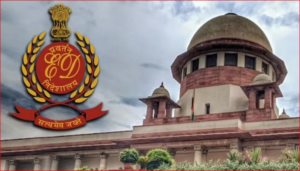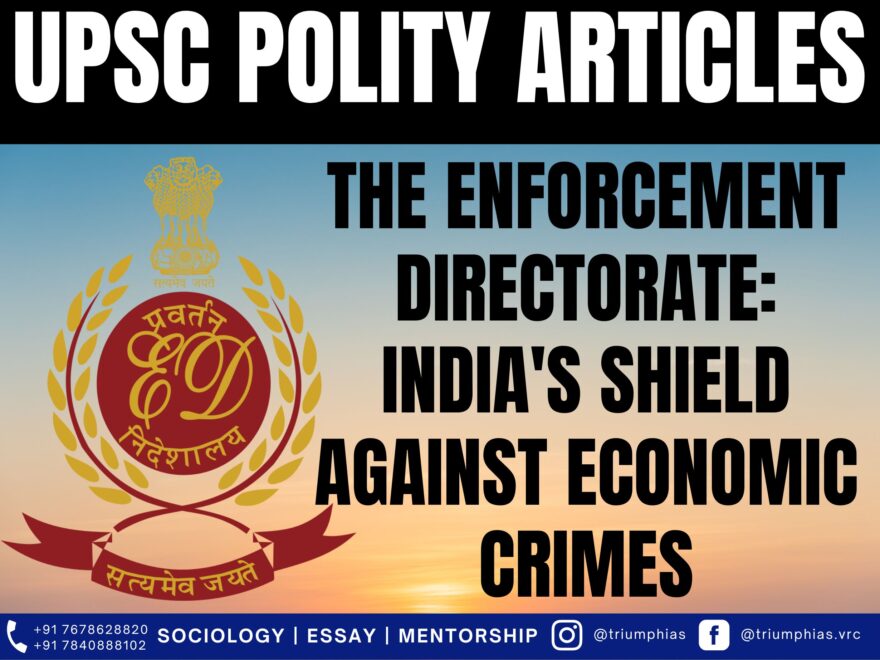Enforcement Directorate (ED)
(Relevant for Polity Section of General Studies Paper Prelims/Mains)

Enforcement Directorate (ED)
The Enforcement Directorate (ED) functions as a law enforcement body operating under the Department of Revenue, Ministry of Finance. Its core mandate is to uphold economic laws and regulations, aiming to counteract financial misconduct and money laundering. The principal objective of the ED involves the examination and legal action against transgressions encompassing foreign exchange breaches, money laundering, and economic fraudulent activities.
Functions of the Enforcement Directorate:
- Implementation of the Foreign Exchange Management Act, 1999 (FEMA)
- Execution of the Prevention of Money Laundering Act, 2002 (PMLA)
- Inquiry into economic wrongdoings like money laundering, illicit funds, hawala transactions,
- and foreign exchange breaches
- Initiation of legal actions against economic wrongdoers
- Retrieval of assets acquired through criminal proceeds
- Collaboration on a global scale concerning economic misconduct cases.
The ED has been effective in combating economic offenses in India. It has investigated and prosecuted a number of high-profile cases like 2G spectrum, Augusta westland, Nirav Modi scam etc. Recently, the ED has arrested former Maharashtra Home Minister in a money laundering case. The case involves allegations that Deshmukh extorted money from bar owners in Mumbai.
However, the ED faces a number of challenges in discharging its duties. These challenges include:
Resource Constraints: The Enforcement Directorate (ED) operates within a confined budget and is relatively small in size. This limitation hampers its capacity to thoroughly probe and take legal action against economic offenses. Limited Collaboration with Other Law
Enforcement Bodies: The ED frequently encounters obstacles when seeking assistance from other law enforcement agencies, such as the police or the Central Bureau of Investigation (CBI). This complicates the process of building robust cases against those involved in economic wrongdoings.
Complex Nature of Economic Crime Cases: Cases of economic crime often possess intricate intricacies, demanding extensive time and effort for thorough investigation. Consequently, achieving convictions becomes a challenging endeavor.
Potential Political Influence: The ED has faced allegations of political interference in the past, potentially undermining its ability to carry out its duties with impartiality and autonomy.
Legal Loopholes and Challenges: The ED confronts legal obstacles in prosecuting individuals who hold foreign citizenship or have multiple nationalities, particularly those beyond India’s jurisdiction. Certain provisions within the Prevention of Money Laundering Act (PMLA) allow offenders to evade investigation by contesting the confiscation of their assets.
Limited International Cooperation: Obtaining cooperation from foreign jurisdictions poses difficulties for the ED due to stringent privacy laws in various countries. This hinders the agency’s access to critical information pertaining to bank accounts and financial transactions.
To enhance the performance of the ED, the following measures can be taken:
- Increased funding
- Better coordination with other law enforcement agencies
- Streamlining of the investigation process
- Improve training
- Reduce Legal complications
- Protection of ED officers from political interference
- Greater cooperation from foreign jurisdictions
The ED is an important law enforcement agency that plays a vital role in combating economic crimes. With the right support, the ED can be even more effective in protecting the Indian economy from criminals. Despite several challenges, the ED has made significant progress in combating economic crimes in India. The agency has investigated and prosecuted a number of high-profile cases, and it has recovered a significant amount of money from economic offenders. With the right support, the ED can be even more effective in protecting the Indian economy from criminals.
Sample Question for UPSC Sociology Optional Paper:
Question 1: Explain the core mandate of the Enforcement Directorate (ED) in India.
Short Answer: The Enforcement Directorate (ED) is tasked with enforcing economic laws and regulations, chiefly focusing on foreign exchange management and prevention of money laundering.
Question 2: List some of the high-profile cases investigated by the ED.
Short Answer: The ED has been involved in investigating several high-profile cases like the 2G spectrum, Augusta Westland, and the Nirav Modi scam.
Question 3: What challenges does the ED face in carrying out its responsibilities?
Short Answer: The ED faces challenges such as resource constraints, limited collaboration with other law enforcement bodies, the complex nature of economic crimes, potential political influence, legal loopholes, and limited international cooperation.
Question 4: What legal frameworks guide the functions of the ED?
Short Answer: The ED operates mainly under the Foreign Exchange Management Act, 1999 (FEMA) and the Prevention of Money Laundering Act, 2002 (PMLA).
Question 5: How can the effectiveness of the ED be improved?
Short Answer: To enhance its effectiveness, the ED could benefit from increased funding, better coordination with other agencies, streamlining of investigative processes, specialized training, legal protections, and international cooperation.
To master these intricacies and fare well in the Sociology Optional Syllabus, aspiring sociologists might benefit from guidance by the Best Sociology Optional Teacher and participation in the Best Sociology Optional Coaching. These avenues provide comprehensive assistance, ensuring a solid understanding of sociology’s diverse methodologies and techniques.
Enforcement Directorate, ED, FEMA, PMLA, Economic Crimes, Money Laundering, Financial Misconduct, Legal Challenges, Indian Economy, Ministry of Finance, Department of Revenue, High-profile Cases, Resource Constraints, Legal Loopholes, Political Influence, Enforcement Directorate, ED, FEMA, PMLA, Enforcement Directorate, ED, FEMA, PMLA, Enforcement Directorate, ED, FEMA, PMLA,
Choose The Best Sociology Optional Teacher for IAS Preparation?
At the beginning of the journey for Civil Services Examination preparation, many students face a pivotal decision – selecting their optional subject. Questions such as “which optional subject is the best?” and “which optional subject is the most scoring?” frequently come to mind. Choosing the right optional subject, like choosing the best sociology optional teacher, is a subjective yet vital step that requires a thoughtful decision based on facts. A misstep in this crucial decision can indeed prove disastrous.
Ever since the exam pattern was revamped in 2013, the UPSC has eliminated the need for a second optional subject. Now, candidates have to choose only one optional subject for the UPSC Mains, which has two papers of 250 marks each. One of the compelling choices for many has been the sociology optional. However, it’s strongly advised to decide on your optional subject for mains well ahead of time to get sufficient time to complete the syllabus. After all, most students score similarly in General Studies Papers; it’s the score in the optional subject & essay that contributes significantly to the final selection.
“A sound strategy does not rely solely on the popular
Opinion of toppers or famous YouTubers cum teachers.”
It requires understanding one’s ability, interest, and the relevance of the subject, not just for the exam but also for life in general. Hence, when selecting the best sociology teacher, one must consider the usefulness of sociology optional coaching in General Studies, Essay, and Personality Test.
The choice of the optional subject should be based on objective criteria, such as the nature, scope, and size of the syllabus, uniformity and stability in the question pattern, relevance of the syllabic content in daily life in society, and the availability of study material and guidance. For example, choosing the best sociology optional coaching can ensure access to top-quality study materials and experienced teachers. Always remember, the approach of the UPSC optional subject differs from your academic studies of subjects. Therefore, before settling for sociology optional, you need to analyze the syllabus, previous years’ pattern, subject requirements (be it ideal, visionary, numerical, conceptual theoretical), and your comfort level with the subject.
This decision marks a critical point in your UPSC – CSE journey, potentially determining your success in a career in IAS/Civil Services. Therefore, it’s crucial to choose wisely, whether it’s the optional subject or the best sociology optional teacher. Always base your decision on accurate facts, and never let your emotional biases guide your choices. After all, the search for the best sociology optional coaching is about finding the perfect fit for your unique academic needs and aspirations.
To master these intricacies and fare well in the Sociology Optional Syllabus, aspiring sociologists might benefit from guidance by the Best Sociology Optional Teacher and participation in the Best Sociology Optional Coaching. These avenues provide comprehensive assistance, ensuring a solid understanding of sociology’s diverse methodologies and techniques. Sociology, Social theory, Best Sociology Optional Teacher, Best Sociology Optional Coaching, Sociology Optional Syllabus.
Best Sociology Optional Teacher, Sociology Syllabus, Sociology Optional, Sociology Optional Coaching, Best Sociology Optional Coaching, Best Sociology Teacher, Sociology Course, Sociology Teacher, Sociology Foundation, Sociology Foundation Course, Sociology Optional UPSC, Sociology for IAS,
Follow us :
🔎 https://www.instagram.com/triumphias
🔎https://www.youtube.com/c/TriumphIAS
https://t.me/VikashRanjanSociology
Find More Blogs
|
Scope of the subject and comparison with other social sciences |
|||
|
|
|
|
Modernity and social changes in Europe |


I completely hope you continue to post blogs because the blog was quite valuable in many ways and was very simple to understand.
I hope you keep uploading more blogs